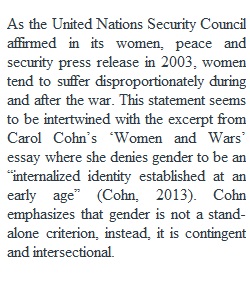


Q 1. Cohn discusses gender as a performance rather than an internalized identity established at an early age. She describes gender as a ‘situated accomplishment,’ where our performance varies depending on context; in every context, there are ‘specific social practices and discursive codes which shape our understanding of how to be a man or a woman' in that context. We “do” gender in that setting through social interactions in which we are responsive to context-specific expectations of masculinity and femininity and to the knowledge that others will hold us accountable for doing so.” Can you relate to this? Are there different contexts where you have experienced that your gender performance is different depending on the context? Can you imagine how this might affect an individual’s behavior during wartime? What does it mean to understand gender as “contingent?” 2. Were any parts of this discussion of gender and war/militarism surprising to you? If you have served in the military, do any of these observations on how this institution is gendered ring especially true or false to you? What do you think of the idea of ‘war’s masculinity being a ‘carefully produced and policed social construct?’ 3. According to the article and your own observations on current events, how is the violence of wars of today more likely to impact women than wars of the past?
View Related Questions